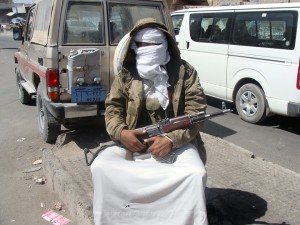Al Qaeda militants traveling in convoys and flying black banners captured a major port city in southern Yemen on Thursday, seizing government buildings and freeing inmates from a prison, including a top Saudi-born leader, security officials said to BG.com.
The fall of Mukalla — the capital of Yemen’s largest province, Hadramawt — highlighted how Al Qaeda is expanding its foothold in Yemen, taking advantage of the turmoil as a Saudi-led coalition backing the country’s beleaguered president tries to fend off a takeover by Shi’ite rebels.
Mukalla’s fall came as the rebels, known as Houthis, made dramatic advances in one of the main strongholds of the president’s loyalists, the southern city of Aden. The rebels broke into the center of Aden and briefly captured a presidential palace in the city.
The rebels withdrew from the palace after raising the Yemeni flag, but the move showed their continued strength despite more than a week of heavy airstrikes by the Saudi-led coalition. If the Houthis succeed in capturing Aden, it would be a significant blow to the coalition, which has been planning to land ground troops in the city to allow the return of President Abed Rabbo Mansour Hadi, who fled the country last week.
Al Qaeda in the Arabian Peninsula, as the terror network’s branch in Yemen is named, has been benefiting from the turmoil ever since the Houthis first surged from their northern strongholds last year to take over the capital, Sana, and much of the north. The rebels are backed in the campaign by military and police forces loyal to Hadi’s predecessor, ousted autocrat Ali Abdullah Saleh.
Around the country, some Sunni tribal fighters have been making alliances with Al Qaeda to fight the rebels, who adhere to the Zaydi branch of Shia Islam.
But the capture of Mukalla was a startling advance. The city lies 300 miles northeast of Aden along the Arabian Sea coast in large but sparsely populated Hadramawt.
The militants fanned out along major roads leading into Mukalla on Thursday and took over the city’s presidential palace, government agencies, and the local Central Bank branch. They tried to break open the bank’s vault with hand grenades but failed, according to witnesses. The witnesses spoke on condition of anonymity for fear of reprisals.
Militants in pickup trucks set up checkpoints across the city, sealing off entrances and exits, while residents were seen entering the offices and looting electronic devices and files, the witnesses said.
The Al Qaeda fighters also freed about 300 inmates from the city’s main prison, including scores of militants, according to security officials.
Among those freed was Saudi-born Khaled Batrafi, a senior Al Qaeda operative believed to have masterminded past attacks, the officials said.
Also freed were 90 death row inmates convicted for a host of criminal offences, according to activists in the city.
After the noon prayers, a top Al Qaeda leader stood up in the middle of the worshipers in the city’s al-Sharag mosque, telling them that he and fellow militants were there only to defend the city from the Houthis.



